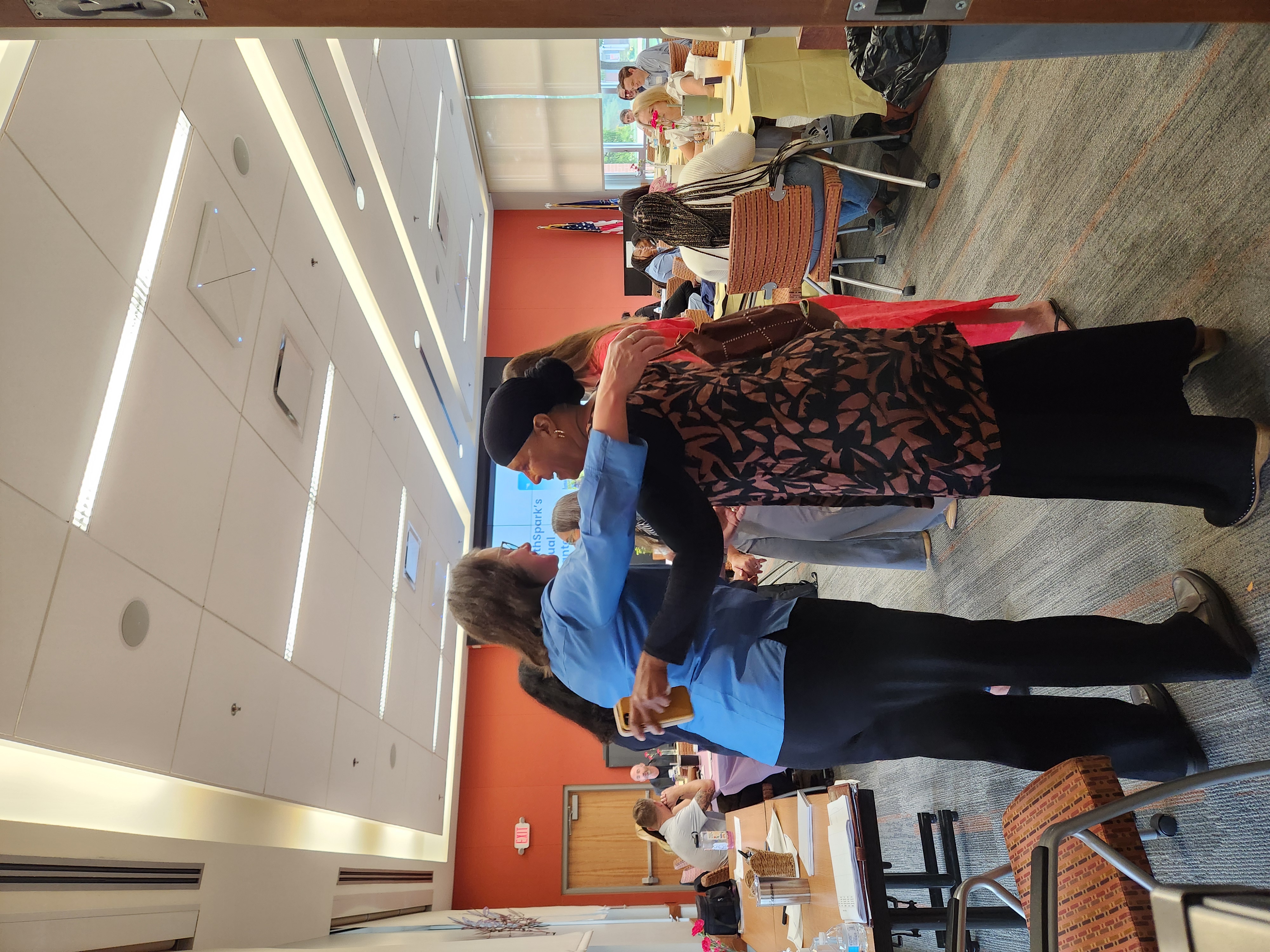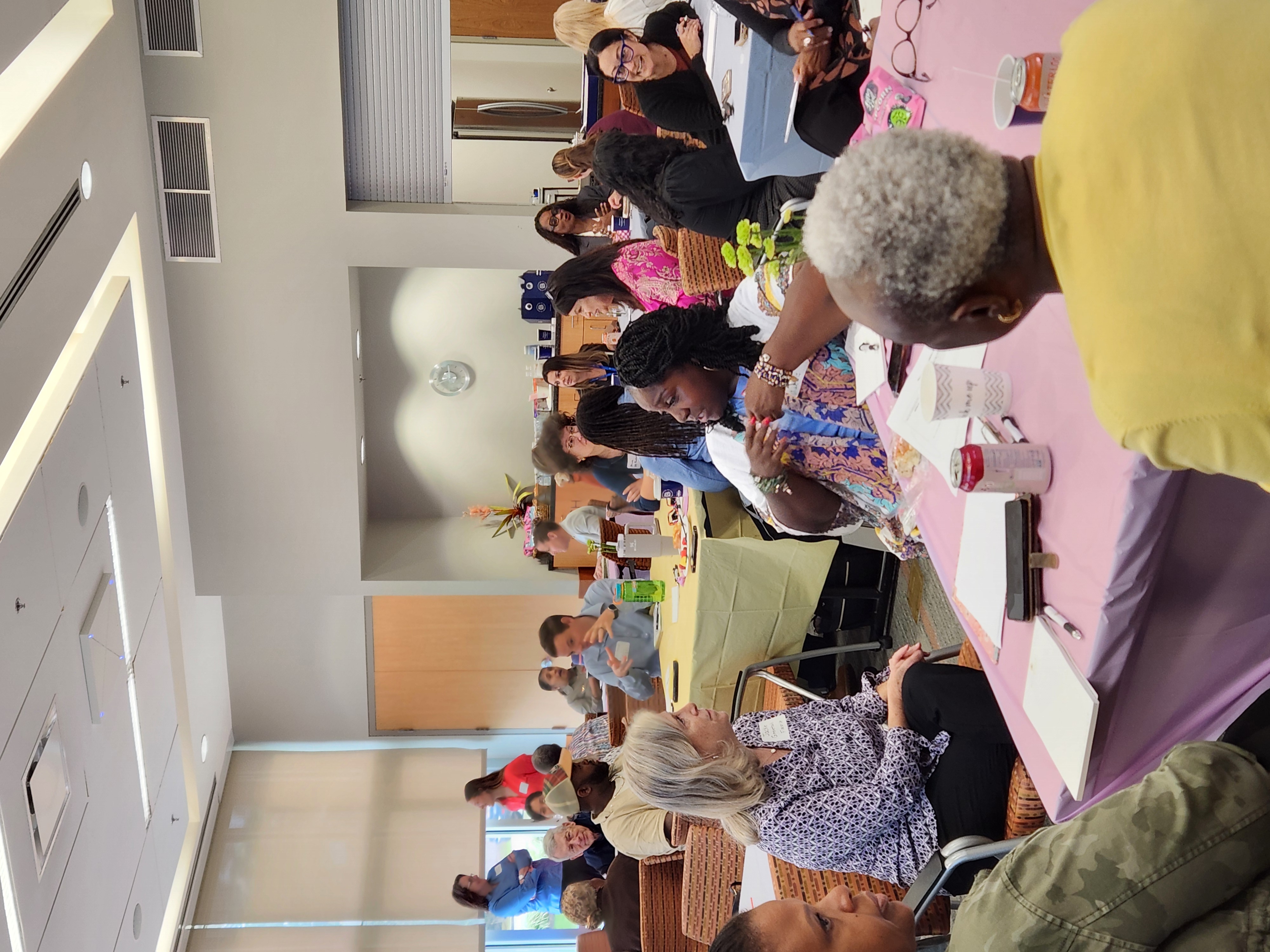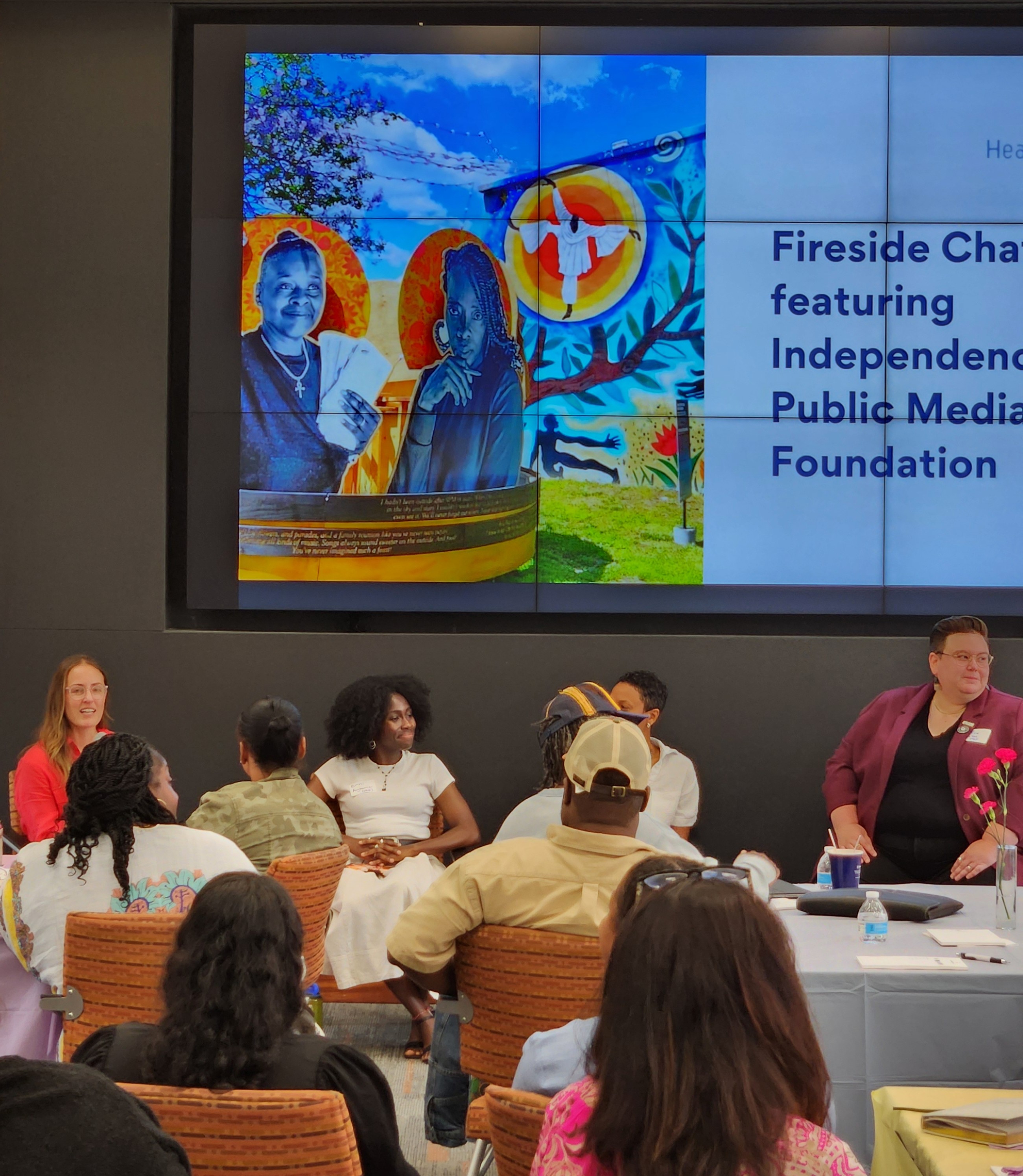Annual Grantee Convening: Power Building Through Narrative Change

Coming Together
In late September HealthSpark gathered with our community partners who represent 35 organizations from across Montgomery County for our annual Grantee Convening. Beyond traditional grantmaking activities, convenings like these serve to support, connect, and build the capacity of leaders and organizations as they continue to contribute to positive social change. They also offer invaluable opportunities for HealthSpark and our partners to learn, reflect, and grow collective power, together. The energy swelled as friends and colleagues filtered into the room, greeted one another, exchanged updates, and swapped stories over light refreshments.
Remaining responsive to our partners’ priorities and the current socio-political landscape, as well as accountable to our commitment to support capacity building related to advocacy and policy, this year’s convening focused on power building through narrative change.

Stories and Narratives
Throughout our lives we are influenced, shaped, and impacted by narratives. Whether oral histories connecting the past to the present and fostering a sense of belonging; mythical tales or folklore that instill timeless life/moral lessons, or inspire visionary futures; dominant cultural/political frameworks that perpetuate separation, harm, and systems of oppression; or everyday accounts of courage, interdependence, and healing that inspire possibility and reflect realities of resistance, resilience, and hope. Whatever the context, we regularly engage in the practice of meaning-making through both the creation and consumption of stories and narratives which, in turn, inform how we perceive and interact with the world around us. Narratives carry power.
Akshara Vivekananthan, HealthSpark Program Officer, formally welcomed everyone and kicked off the convening with a personal story. She shared her family’s journey of building a life intentionally infused with joy, love, and celebration in the United States against a painful backdrop of forced migration from Sri Lanka. Demonstrating courage and vulnerability, and the potency of narrative shifting, Akshara set the stage for exploring the importance of storytelling as a tool for advocacy, community engagement, and facilitating healing and transformation.
Community partners were then invited to pair up with someone new for a short activity to build connection and deepen understanding by way of a series of prompts. Engaging conversations were in no short order as partners shared and dialogued, discovering both points of intersection and divergence. We returned to our large group, a little more informed, aware, and connected for a brief share out.

Storytelling is Power
To guide us through an exploration of storytelling and narrative change as tools for power building we welcomed Nuala Cabral, Samíl Jimenez-Magdaleno, Melissa Hamilton, and Enni Aigbomian from Independence Public Media Foundation (IPMF). A regional foundation located in Philadelphia, IPMF seeks to change the way stories are told, who tells them, and who holds the power in media and digital access through funding community-owned and community-led media and internet projects. Central to their mission is the work of narrative change – the countering of “harmful narratives while advancing ones that support movements that challenge systemic oppression, build collective power, and shape policies reflecting holistic, collective needs.”
By highlighting the innovative and compelling work of their grantees and other changemakers IPMF demonstrated the link between narrative change and power, the myriad ways to engage in narrative work and media-making, and how media can catalyze movements for social justice and be a method for achieving change. Two examples are community partners of both IPMF and HealthSpark: The Welcome Project of PA and CCATE (Centro de Cultura Arte Trabajo y Educacion). With support from IPMF, The Welcome Project of PA produced See Me, Hear Me, Know Me – a short documentary film chronicling the development of Trans, Nonbinary, and Intersex Healthcare Best Practices that is helping to change the landscape of healthcare in the Philadelphia suburbs. Supported by a Community Storytelling grant, CCATE created powerful media making projects including Radio Revarte, the first community and educational radio station for the Latino and immigrant community in Montco.
The staff of IPMF also shared considerations for organizations to reflect upon before engaging in narrative change work. It was a relevant and provoking presentation that reinforced the importance of supporting the advocacy capacity of community partners, leaders, and changemakers as an effective strategy for achieving positive social change.
Below are a few key takeaways, or ‘golden nuggets’ from what IPMF shared:
- Stories are powerful tools in shaping public opinion and influencing policy.
- Narrative change happens when a collection of stories work together to form a pattern that advances accurate, empowering narratives.
- Narrative change is a process of evolving the stories told in and about our culture. If we can change the stories, we can change the way people understand the world.
- It’s not necessarily the number of eyes who see your work, but more importantly, whose eyes. An inspiring example is the short documentary No Way Home, produced by IPMF grantee Amistad Law Project.
- Storytelling requires a level of responsibility. Yes, there is a risk, but risks must be taken while also ensuring that people are safe.
- If you want to tell a community’s story, consider the following first:
- How will you enter and exit the community, and do you have permission?
- Are you the right person to tell that community’s story? Is there someone who is more authentically connected to the community who would be more appropriate?
- Check your facts. And then check them again.
Before transitioning to a fireside chat and Q&A moderated by HealthSpark President and CEO Emma Hertz, IPMF left us with a roadmap to guide the process of creating a narrative change project.
- What goal does this narrative change project aim to achieve?
- Who is the audience whose views you hope to shift?
- Which tactics will you use?
- What is the distribution plan for the content to reach your audience?
- How will you measure and evaluate success?

Narrative Mapping
Inspired and motivated with a few new tools, grantees were invited to identify and workshop a story they would want to share with an elected official, funder, or community member. Guided by Meghan McVety, Principal and Cofounder of Capacity for Change, grantees worked to define a target audience, outline the elements of the story, and map out a clear call to action. While testing ideas and experimenting with stories grantees were also building their capacity for integrating storytelling into their organization’s work as a means of amplifying the voices and narratives of community members.
Moving with Courage and Integrity
HealthSpark President and CEO Emma Hertz returned to the podium to share a few closing remarks. Underscoring the devastating impacts that funding cuts and retributive attacks on programs and services have had on non-profits and the communities they serve while also recognizing the challenging position many non-profits are in as a result, Emma invited grantees to continue moving forward with courage and integrity. She acknowledged the privileged position, and responsibility, that foundations like HealthSpark have to speak freely when it comes to supporting policies and practices that promote racial and social justice. Despite an environment intended to incite fear, silence, and complicity, she encouraged everyone to think critically about the long-term impacts of choices made today. It is with a deep appreciation for these challenging realities that HealthSpark remains committed to standing with our partners, whether through amplifying their voices via our communications, investing in leadership development and peer support, or increasing our grants budget over the next three year.
Partner Pulse
As a learning organization, HealthSpark is committed to practicing participatory evaluation to improve our responsiveness and accountability to community priorities. We pursue our goals through partnerships and seek to infuse all our grantmaking and non-grantmaking strategies with community participation and voices. One way we practice this is through our partner pulse – a series of questions aimed at learning how HealthSpark can be the most effective partner. Bringing our half-day convening to a close, grantees reflected, wrote, and shared their responses with our staff and one another. An overarching theme that resonated with many partners was desire for more opportunities to network and connect. Partners noted that while funding is critical, bringing people together is invaluable.
I always leave with new ideas to implement, new connections to others in the nonprofit space, and most importantly feeling that we are in this together.
HealthSpark Partner, anonymous feedback survey
Narrative power is derived from the ability to determine which meaning-making systems people use to interpret the world. The work of narrative change is both a tool to generate power and a conscious practice of healing and transformation. Join us on this journey as we continue to amplify the voices of our partners, uplift their stories of courage, hope, integrity and justice, and shift narrative power.